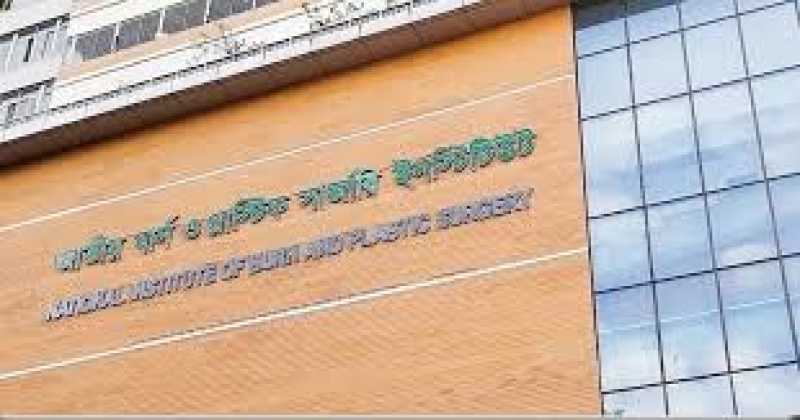- World Cup ticket prices to start at $60, may rise to $6,730 |
- Gazipur kitchen market fire under control after one hour |
- 10 MNC to enter bourse; Dhaka Stock Brookers laud BSEC |
- Dhaka bourse sees highest turnover in 12 months |
- Xi unveils vision for equitable global governance, rejects unilateralism |
Burn Patients in Bangladesh Suffer as Facilities Fall Short

For burn victims survival often hinges on a race against time but for those living far from the capital in Bangladesh race is increasingly unwinnable.
Bangladesh saw 140 deaths in 26,659 fire incidents reported across the country in 2024, according to Fire Service and Civil Defence.
Access to specialised burn treatment outside Dhaka remains extremely limited, forcing critically injured patients to rely on the overburdened National Institute of Burn and Plastic Surgery in the capital, while the actual need is even higher.
A government project to set up 100-bed burn and plastic surgery units at five major medical college hospitals — in Sylhet, Barishal, Rangpur, Rajshahi and Faridpur — was supposed to bring some changes.
But the long-awaited project is facing major delays and a significant cost hike.
Initially approved in January 2022, the project was scheduled for completion by June, 2025 at a cost of Tk 456.08 crore.
But delays, redesigns, and a staggering 78.96% cost hike — raising the revised budget to Tk 816.19 crore — have pushed the completion deadline to June 2028.
Of the revised allocation, Tk 464.74 crore will come from the government exchequer (GOB) while Tk 351.45 crore will be provided as a loan from the Saudi Fund for Development (SFD).
The government initiated the project in 2017 and it was approved by the Executive Committee of the National Economic Council (ECNEC) in December 2021.
Administrative approval followed in April 2022. The original plan envisioned completion by June 2025.
According to a project document obtained by UNB, the delay stems from a series of unforeseen challenges, including the Covid-19 pandemic, site selection complications, and revisions in the project design.
Initially, the plan involved vertical expansion and floor renovations in existing structures, but structural flaws — including cracks in parts of the Rajshahi Medical College Hospital premises — forced a shift to constructing entirely new buildings.
However, the scope was later changed to construct entirely new dedicated buildings at all five medical college hospitals.
Under the revised plan, 11-storey foundation structures with six floors initially at Sylhet, Rangpur, Rajshahi, and Barishal medical colleges.
In Faridpur, a nine-storey building on an 11-storey foundation will be built due to land constraints.
The new facilities will each cover over 8,400 square meters and house state-of-the-art burn and plastic surgery units.
Officials said construction costs surged primarily because of the updated Public Works Department (PWD) rate schedule in 2022 which significantly raised civil works estimates.
“The cost escalation became unavoidable. Besides, the SFD requested a fresh cost reassessment as the original agreement was signed nearly five years ago,” a senior Planning Commission official said.
The revision also incorporates five new expenditure codes for special facilities, telecommunication equipment, stamps, and other operational needs, further contributing to the cost hike, he said.
Experts and healthcare professionals say the delay is causing suffering to burn victims outside Dhaka.
As there is no specialised burn unit in these districts, critical patients need to be rushed to the National Institute of Burn and Plastic Surgery in the capital which is already overwhelmed with cases.
“Every day we receive critical burn patients from across the country and unfortunately many of them die because they do not get timely treatment closer to home,” said a senior doctor at the Burn Institute seeking anonymity.
“The establishment of regional burn units is crucial to saving lives,” he added.
Doctors on the frontlines say the delay is costing lives. “The first four to five hours after a burn injury — the golden hours — are crucial. But we often fail to treat patients in time due to the lack of local facilities. Many patients die on the way to Dhaka,” said a doctor of the burn unit at Mymensingh Medical College Hospital.
Once completed, the project will benefit nearly 6 crore people in the five districts and surrounding areas, providing affordable, quality treatment for burn and reconstructive surgery cases.
It is also expected to reduce the pressure on Dhaka hospitals.
The Planning Commission, in its review, has recommended forwarding the revised proposal to the Executive Committee of the National Economic Council (ECNEC) for approval to fast-track implementation.
Officials stressed that timely completion is essential to strengthening the country’s burn and plastic surgery treatment network, improving emergency response capacity and saving lives.
In Bangladesh, burns are mainly caused by fire, electricity, and chemicals, with thermal and electrical burns being the most common. Recent incidents, like the Uttara plane crash and fires in markets and homes, have added to the growing number of burn victims in urgent need of care, reports UNB.

